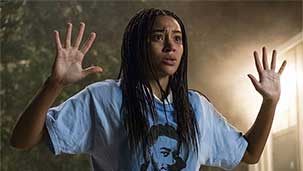Let us talk about Starr Carter. Young adult literature has no shortage of iconic female protagonists, often battling through some kind of post-apocalyptic, dystopian hellscape. In The Hate U Give, Starr exists in the real world, but the forces she confronts are no less dystopian.
Starr anchors a narrative with a lot going on, and while there was ample space in your novel, Angie, to explore side plots and develop characters without ever pulling focus from Starr, I was curious as to whether your screen adaptation, Audrey, would be able to do the same. There are so many compelling narrative touch points, and so many angles that could each easily have split the audience’s focus, and so I feel like you both deserve full and equal credit, for a novel that brought Starr into being, and a screenplay that respects its source material and retains her perspective and agency throughout.
The Hate U Give touches upon a number of timely and controversial issues, with the central plot surrounding the police shooting of a young, unarmed Black man. There are many angles from which to analyze the film, but the one that caught my attention was the film’s take on female anger – specifically Black female anger. At the end of 2016, I proclaimed Paul Verhoeven’s Elle to be “the best and angriest film of the year.” I subsequently went down a bit of an Angry Woman rabbit hole, further thinking and reading about the way female anger is portrayed, stigmatized, and suppressed from the time we are little girls. There are plenty of films out there about the cataclysmic consequences of a woman’s anger - usually bloody revenge sprees geared towards the titillation of male audiences. Anger in young girls seems to be an even more terrifying prospect, because when they get mad, prom night always ends in carnage. Apparently.
We are still wholly uncomfortable with seeing women and girls express unchecked anger (unless they channel it towards battling evildoers while dressed in something skimpy and impractical), and this appears to be especially true for Black women and girls. That bullshittiest of tropes, the Angry Black Woman, has long been deployed for ridicule and a good cautionary tale. It sticks Black women and girls with a disproportionate amount of pressure to be polite, calm, and accommodating, evident by the tone policing and swift chorus of “Whoa-whoa-whoa”s every time a Black woman raises her voice above a whisper in any forum.
Watching Starr, I was reminded of a recent article in which the magnificently, unapologetically angry Mona Eltahawy expresses a desire to “…bottle-feed rage to every baby girl so that it fortifies her bones and muscles” She asks, “What would the world look like if girls were taught they were volcanoes?” I feel like Starr is the proud answer to that question.
Usually, when girls get angry, immediate steps are taken to suppress that anger before it gets ’out of control’. In The Hate U Give, Starr is given carte blanche to get as angry as she damn well wants and, amazingly, everyone still survives prom night. In scenes where Starr loses her temper, I expected her to be quickly quashed by another character chiming in with a “calm down“ or “getting mad won’t solve anything”, but Starr doesn’t allow it. The two best examples of this are Starr’s confrontations with a friend at school, and with her police officer uncle; She gets good and angry, and does not back down until she has her say. There are plenty of points at which having her defer to an older, or white, or male character’s viewpoint seems imminent, but Starr insists on having the last word. More importantly, rather than being portrayed as destructive or ‘snapping’, there is dignity afforded to her anger. Most importantly, she is not made to apologize for or qualify her anger. There is no “I’m sorry”, only “I said what I said.”
The Hate U Give is the story of a specific experience within a specific community, and care is rightfully taken to avoid diluting it or the events depicted in it by forcing a sense of ‘relatability’ for everyone who sees it. Starr represents an important step specifically regarding depictions of Black women and girls onscreen, but in a broader context, is also a promising alternative to the representation of angry women and girls all around, and I thank you both for that. So much.
Best,

Nat







